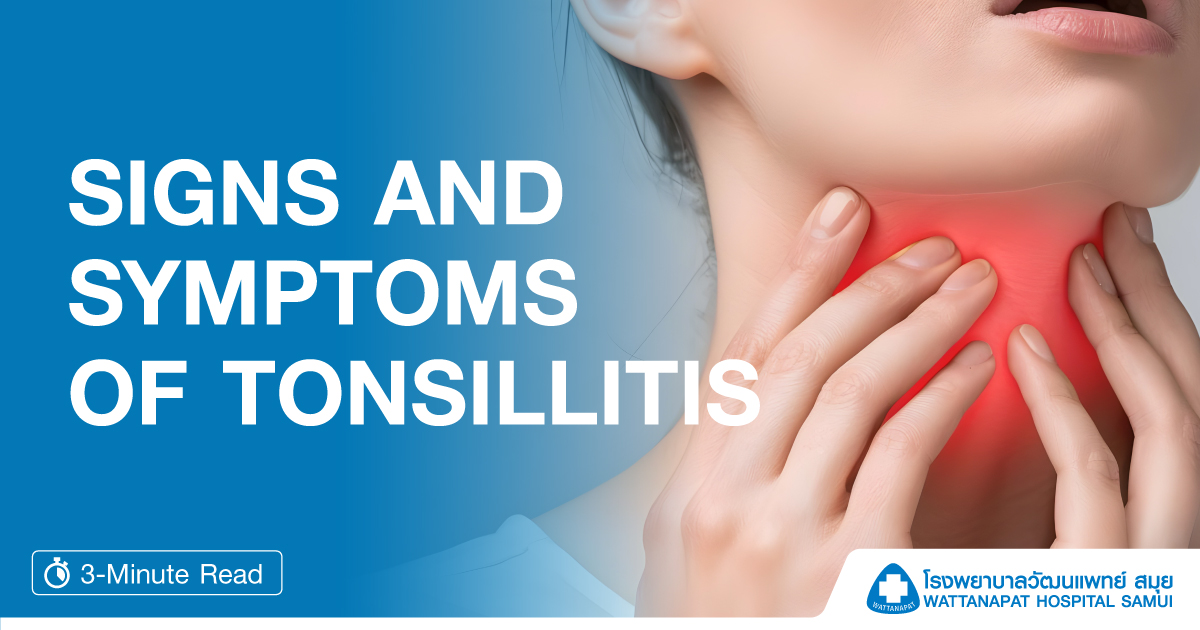Signs and Symptoms of Tonsillitis
5 Telltale Signs of Tonsillitis
What Is Tonsillitis?
Tonsils are a crucial part of your immune defense, acting as sentinels that capture pathogens entering the body through the mouth and nose. However, these very tonsils can themselves become infected, leading to inflammation and swelling—commonly known as tonsillitis.
Tonsillitis is a health issue that affects people across all age groups, although it’s particularly prevalent in children and teenagers. This condition can cause significant discomfort, and if not treated properly, it may lead to complications. In this article, we’ll delve into the key warning signs of tonsillitis, helping you recognize when you might be experiencing this condition so that you can take steps to prevent it from worsening.
Symptoms of Tonsillitis
1. Severe Throat Pain
The most noticeable symptom of tonsillitis is often a severe sore throat. This pain feels much more intense than a typical sore throat and tends to persist throughout the day. The discomfort can make swallowing food or even liquids a challenge.
The Cause of Throat Pain: This intense pain stems from inflammation within the tonsils due to infection. As the tonsils swell, they put pressure on the surrounding tissues, leading to that unmistakable soreness.
2. Swollen and Red Tonsils
A clear sign of tonsillitis is visibly swollen and reddened tonsils. In some cases, you might even notice white spots or lesions on the surface, which indicate a bacterial infection has taken root.
How to Identify Swollen Tonsils: You can check for swollen tonsils by looking in a mirror and opening your mouth wide. If the swelling is prominent and accompanied by redness, it’s time to consult a healthcare professional for diagnosis and treatment.
3. High Fever
A high fever often accompanies tonsillitis, particularly when the infection is caused by bacteria. The body’s temperature can rise above 38°C (100.4°F) as the immune system battles the infection.
Managing Fever: Medications like paracetamol or ibuprofen can help reduce fever and alleviate discomfort. However, if the fever persists, it’s crucial to seek medical attention.
4. Difficulty Swallowing
The inflammation and swelling caused by tonsillitis can make swallowing extremely painful, even when attempting to ingest something as simple as water or saliva. This pain may also radiate to the ears.
Relieving Swallowing Pain: Warm liquids such as herbal teas—like chamomile or ginger—can offer relief from the pain and make swallowing easier.
5. Bad Breath
Tonsillitis often leads to foul-smelling breath due to the buildup of bacteria and dead cells in the infected tonsils. This strong odor is an unmistakable sign of infection that shouldn’t be ignored.
Combatting Bad Breath: Maintaining good oral hygiene by regularly gargling with salt water and brushing your teeth can help mitigate bad breath. However, treating the root infection is the only way to fully eliminate this symptom.
Treating Tonsillitis
If you notice any of the above signs, it’s important to see a doctor for an accurate diagnosis and proper treatment. Depending on the cause, treatment may involve the following:
1. Antibiotics
For cases where bacterial infection is the culprit, a doctor will likely prescribe antibiotics to eliminate the bacteria and reduce inflammation. It’s essential to complete the full course of antibiotics to prevent recurrence or complications.
2. Tonsillectomy (Surgical Removal)
In severe or chronic cases, where tonsillitis frequently returns or doesn’t respond to medication, a tonsillectomy might be recommended. This surgical procedure removes the tonsils entirely to prevent future infections.
Preventing Tonsillitis
Taking steps to maintain overall health and keeping the mouth clean can significantly reduce the risk of developing tonsillitis.
Hand Hygiene
Frequent handwashing is crucial in preventing the spread of germs that could lead to infections, including tonsillitis. By practicing good hand hygiene, you reduce the likelihood of introducing harmful bacteria or viruses into your system.
Oral Hygiene
Brushing your teeth at least twice a day and flossing regularly helps keep your mouth free from bacteria buildup. This reduces the chances of infection and inflammation in the tonsils.
Tonsillitis is a common condition that can affect people of all ages, but with proper attention to symptoms and swift treatment, it can be managed effectively. If you experience severe throat pain, swelling in the tonsils, or any of the other warning signs mentioned, don’t hesitate to consult a healthcare provider. Early intervention can prevent more serious complications down the road.



